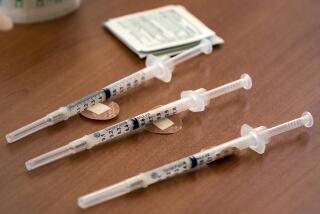Pfizer to disclose payments to doctors next year
- Share via
TRENTON, N.J. — Pfizer Inc., the world’s biggest drug maker, said Monday that it would begin disclosing all sizable payments it makes to doctors, including those who test experimental drugs in people, a first for the industry.
The disclosures will begin early next year and are planned to include all payments to a doctor or other prescriber exceeding $500 in a year, the New York firm said.
The move comes after introduction last month of legislation to require such disclosures, and revelations of astronomical payments to some doctors that were not revealed to universities and hospitals that employed them.
“It’s very important that we earn the trust of patients and the public,” Pfizer Chief Executive Jeffrey Kindler said.
The initiative is one of several by Pfizer in recent years to disclose more information about its drugs and business operations.
Consumer groups, politicians and others increasingly have been criticizing industry payments to doctors who promote a particular drug brand to colleagues, provide consulting services to drug makers or work on human tests of experimental drugs, yet don’t disclose that they are receiving tens of thousands of dollars -- even millions, in rare cases -- for those services.
A handful of drug makers, including Merck & Co. and Eli Lilly & Co., have recently announced plans to disclose payments for consulting, giving speeches and the like.
Pfizer is the first company to add payments to doctors who work on clinical studies, write up reports on them for medical journals and otherwise provide behind-the-scenes support for getting a drug approved by regulators.
Some industry critics, but not all, praised the move.
Sen. Charles E. Grassley (R-Iowa), the ranking Republican on the Senate Finance Committee and co-sponsor of a bill introduced last month to require such disclosures by drug and medical device makers, called the Pfizer news a tribute to how far the reform movement had come.
“There’s so much public money and public trust at stake with the financial relationships between the pharmaceutical industry on one end and the practice of medicine on the other end, that the public has a right to know what those relationships are,” Grassley said in a statement. “Every step in the direction of disclosure is a step in the right direction and helps to build the case for passage of legislation to establish nationwide reporting of this kind of information.”
Grassley and Sen. Herb Kohl (D-Wis.) are jointly sponsoring the Physician Payments Sunshine Act of 2009, which would require makers of traditional pills, biological drugs and medical devices to annually report all payments to doctors of more than $100 to the U.S. Department of Health and Human Services. The bill includes penalties of as much as $1 million for knowingly failing to report such information.
A similar version was introduced two years ago.
More to Read
Inside the business of entertainment
The Wide Shot brings you news, analysis and insights on everything from streaming wars to production — and what it all means for the future.
You may occasionally receive promotional content from the Los Angeles Times.










